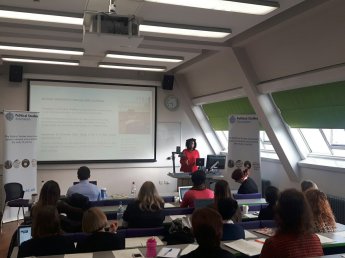 Jessica Smith (Birkbeck), Communications Officer for the PSA Early Career Network, reflects on the ECN’s recent workshop on ‘Demystifying and Navigating Early Career Academia’, held at the University of Manchester on 3 February 2017.
Jessica Smith (Birkbeck), Communications Officer for the PSA Early Career Network, reflects on the ECN’s recent workshop on ‘Demystifying and Navigating Early Career Academia’, held at the University of Manchester on 3 February 2017.
In February, the Political Studies Association’s Early Career Network hosted a day of workshops and panels at the University of Manchester aimed at demystifying early academia and discussing how we can increase diversity in our ranks, co-sponsored by the PSA Women and Politics Specialist Group. The most recent figures from the Higher Education Statistics Agency showed that just 24 per cent of UK professors are women, we know that it is lower in political science (around 20%) and that numbers for BME representation are even worse. The day offered training sessions for early career academics within which there was recognition of the varying experiences different identities and backgrounds can create. The day finished with a panel on increasing diversity in early academia; our guest speaker Dr Rachel Thwaites spoke about her new book ‘Being an Early Career Feminist Academic’; and the new Chair-Elect for the PSA Professor Angelia Wilson gave the keynote. All the sessions were insightful and our contributors displayed an expert range and depth of knowledge on topics from REF and TEF to writing a cover letter. The day lent itself to a range of discussion, on the academic pipeline, unique issues facing early career academics, and how we can all aspire to be the ‘good’ academic citizen, but I thought I would share with you three of the best pieces of advice that came out of the day.
It takes raindrops to make a river.
Dr Louise Owusu-Kwarteng shared this family saying with us during the panel on increasing diversity in academia. It reflects well the common feeling that progress can be slow but every little bit counts. Dr Owusu-Kwarteng and Dr Akile Ahmet presented their research on the experiences of BME students in higher education. One of the oft cited issues for BME students was a lack of culturally relevant support and role models. Perhaps not surprising given the under-representation of BME groups in academia; Dr Ahmet showed how the numbers of BME academics as you move up the pipeline made dire reading. At the LSE, a central London university, only 16 out of 214 professors are BME men or women. Research from Shardia Briscoe-Palmer and Dr Kate Mattocks has found that PhD students from minority groups were less likely to consider staying on in academia, more likely to cite caring responsibilities as an issue and more likely to say they’ve faced exclusion and isolation. Institutions need to review their support measures and ensure that we push for change from the bottom-up ensuring diversity in the retention of under-grads and post-grads to create those raindrops. Not only this, but we mustn’t let the rain stop, we cannot forget that progress can go backwards as well as forward which reiterates the importance of gathering and monitoring data on diversity.
Apply to an institution because you think they deserve you – even if they don’t know it yet!
Our discussion on the academic job search focused on the fact that academics face a global market. Early career academics need to be able to sell themselves – be a second-hand car salesman as Professor Sarah Childs said. And we do mean salesman, we know ‘selling yourself’ can be more challenging for women; studies have shown that women find it hard to promote their own achievements and talents. Dr Ahmet gave our participants some sage advice – tell the institution why they deserve you, not why you deserve the job. We know that the academic job market is getting harder and harder for those coming out of their PhDs and the ECN wants to work with our members to see how we can help; for instance, we are holding a ‘speed mentoring’ event at the PSA Conference in Glasgow this year. Joining a PSA specialist group (such as the Women in Politics Group) can also be a vital source of support in hearing about jobs and having those all-important contacts (outside of your own institution) when you are first starting out.
Build ladders, not potholes.
On the same day as being announced as the PSA’s new Chair-Elect, Professor Angelia Wilson gave our attendees an inspiring talk on her experience in academia and the importance of perseverance (even if, like her, you get told to go back to the farm). She reiterated the need for good role models – “choose someone at the top and think ‘I want to be like them’, and then tell them!”. The talk sparked off a discussion of how we can all endeavour to be the ‘good’ academic citizen, helping those around us. As Professor Wilson said – if it has come easy to you, look around and ask yourself why, own your privilege, and then turn around and help someone who may not be having it so easy. For instance, we know women take on disproportionate amounts of care and admin tasks which are less valued in academia. If you have a secure position why not take on some of these roles and share the burden. Or support women running for the ‘high value’ jobs. Another suggestion was male colleagues could refuse to be on ‘manels’ – all male panels. We know that we need action and support from everyone to build the ladders for all.